新视野大学英语(3)讲稿Unit 2
- 格式:doc
- 大小:57.50 KB
- 文档页数:6
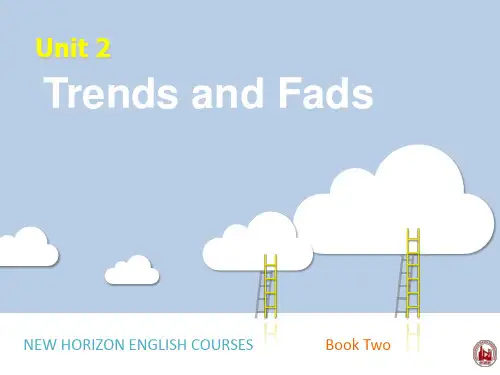
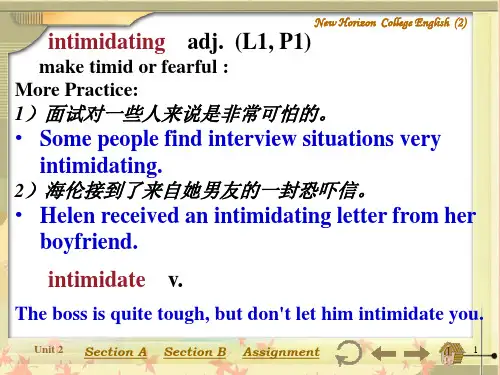
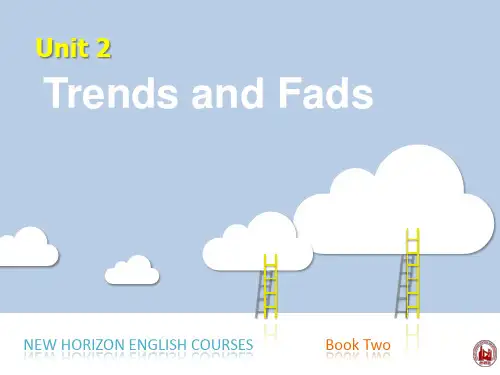
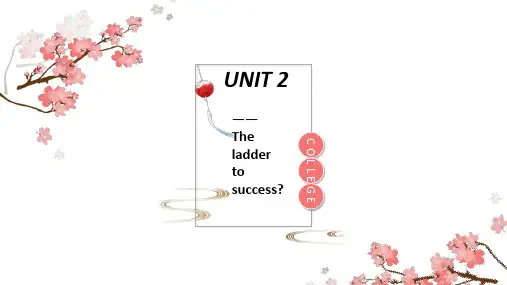
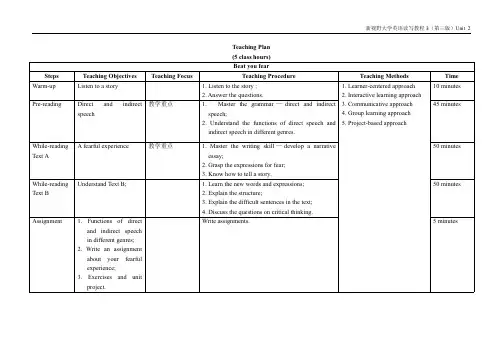
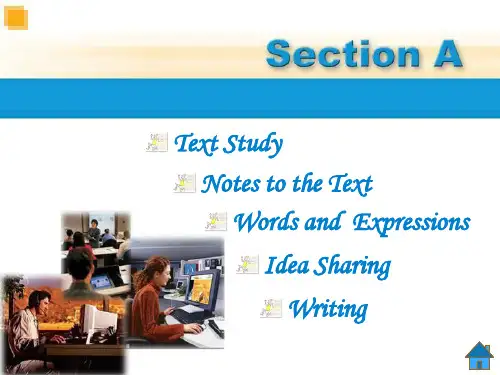
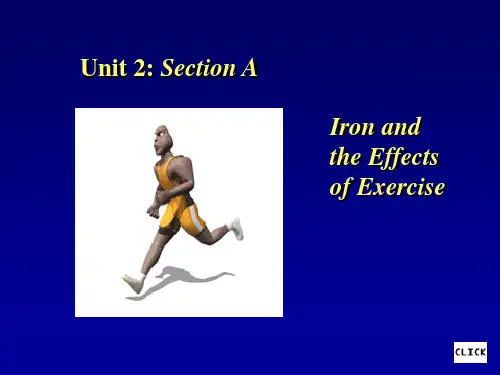
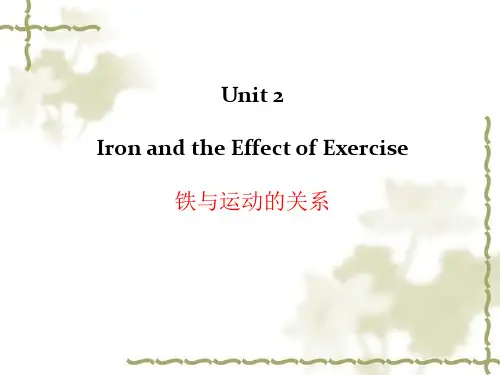
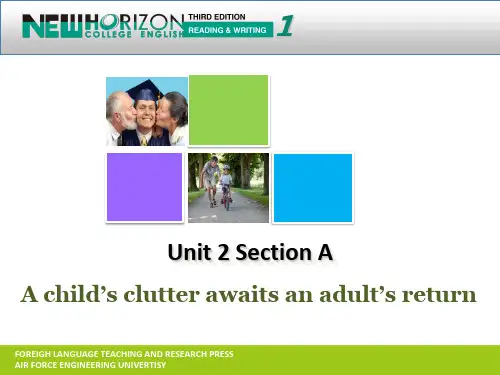
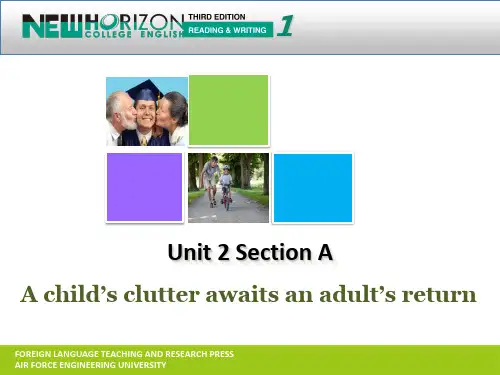
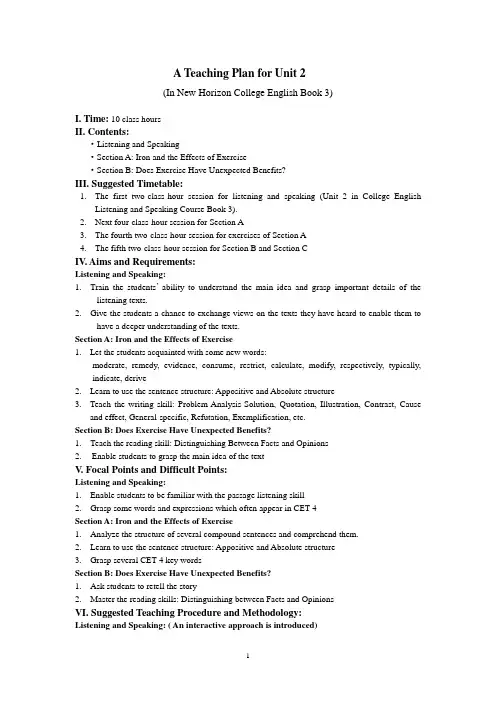
A Teaching Plan for Unit 2(In New Horizon College English Book 3)I. Time:10 class hoursII. Contents:·Listening and Speaking·Section A: Iron and the Effects of Exercise·Section B: Does Exercise Have Unexpected Benefits?III. Suggested Timetable:1.The first two-class-hour session for listening and speaking (Unit 2 in College EnglishListening and Speaking Course Book 3).2.Next four-class-hour session for Section A3.The fourth two-class-hour session for exercises of Section A4.The fifth two-class-hour session for Section B and Section CIV. Aims and Requirements:Listening and Speaking:1. Train the students’ability to understand the main idea and grasp important details of thelistening texts.2. Give the students a chance to exchange views on the texts they have heard to enable them tohave a deeper understanding of the texts.Section A: Iron and the Effects of Exercise1.Let the students acquainted with some new words:moderate, remedy, evidence, consume, restrict, calculate, modify, respectively, typically, indicate, derive2.Learn to use the sentence structure: Appositive and Absolute structure3.Teach the writing skill: Problem-Analysis-Solution, Quotation, Illustration, Contrast, Causeand effect, General-specific, Refutation, Exemplification, etc.Section B: Does Exercise Have Unexpected Benefits?1. Teach the reading skill: Distinguishing Between Facts and Opinions2.Enable students to grasp the main idea of the textV. Focal Points and Difficult Points:Listening and Speaking:1. Enable students to be familiar with the passage listening skill2. Grasp some words and expressions which often appear in CET-4Section A: Iron and the Effects of Exercise1. Analyze the structure of several compound sentences and comprehend them.2. Learn to use the sentence structure: Appositive and Absolute structure3. Grasp several CET-4 key wordsSection B: Does Exercise Have Unexpected Benefits?1. Ask students to retell the story2. Master the reading skills: Distinguishing between Facts and OpinionsVI. Suggested Teaching Procedure and Methodology:Listening and Speaking: ( An interactive approach is introduced)1. Pre-listening Task: arrange the students in pairs and ask them to discuss the questions in theirbooks.①What is coincidence? Give an example to illustrate it.②Have you ever experienced or read about an amusing case of coincidence? What is it?③What do you think can be the causes of coincidences? Do you think coincidences arebeyond chance?2.Background Information:Coincidences occur in everyone’s life, but probably not so dramatic as those mentioned in the texts. Coincidences make great stories. As the old Chinese saying rightly points out, ‘No coincidences, no stories.’The performing world is very good at making use of their dramatic effects and many plays and movies are based on such happenings.In many cultures, people have tried to explain this phenomenon. Most regard coincidences as pure chance but others think they are beyond chance, and are somehow connected to certain supernatural forces that they believe exist.Another explanation is that coincidences are the result of our own memories. The human mind tends to remember every single case of coincidence but forget hundreds of, even thousands of, cases where no coincidence occurs. In the Lincoln and Kennedy case, for example, people list only what the two incidents have in common but ignore what they don’t have in common, and, as a result, an amusing set of random connections are transformed into a mysterious, seemingly inexplicable pattern. And to understand the coincidences that happened to the twins, we can probably turn to genetics for help. The same genes inherited from their parents, in a way, account for the similarities in certain behavior patterns of the twins.Hopefully, with the further development of science, there will be more convincing answers to certain cases of coincidence.3.Listening to Text 1 and 24.Speaking Tasks: Ask the students to get into pairs and explain to them how to carry outSpeaking Task A - Reflections on the texts, then select a pair to present their views in class.Section A Iron and the Effects of Exercise1. Background Information:①digestive systemThe digestive system is a series of hollow organs joined in a long, twisting tube from the mouth to the anus. Inside this tube is a lining called the mucosa. In the mouth, stomach, and small intestine, the mucosa contains tiny glands that produce juices to help digest food.②Medicine &Science in Sports & ExerciseIt is a multidisciplinary journal featuring original investigations, clinical studies, and comprehensive reviews on current topics in sports medicine and exercise science. With this multidisciplinary journal, exercise physiologists, physiatrists, physical therapists, team physicians and athletic trainers get a vital exchange of information from basic and applied science, medicine, education, and allied health fields.2. Pre-reading ActivitiesListen to short passage twice and answer questions①Why do women often not have enough iron in their bodies?②If iron levels are low, what problems can women experience?③What can you eat to get iron and what disadvantages can these supplements sometimes have? Listening Passage:Women and especially female athletes often have a deficiency of iron in their bodies. This is often because they eat too restricted a diet. New research suggests that even moderate levels of exercise can actually cause lower levels of iron in females. This can cause them to feel tired, weak and breathless. Women often have such a deficiency because they do not eat enough of the correct types of food to get iron: meat, chicken, fish, etc. One reason is that they choose to avoid these foods to control their weight. Iron supplements are only of limited value and sometimes can be poisonous. The research results indicate that active women should not forget the importance of iron in their diet.3.Work on Section AA) Structure of the Text ( A method of analyzing the text structure is employed)Part 1 (1-3) Exercise, even moderate exercise may lead to reduced iron in the blood ofwomen. There are three groups of people who are likely to suffer fromiron deficiency.Part 2 (4-6) Iron deficiency is very common among women. There are several causesfor it.Part 3 (7-12) The author tells us t he effects of iron deficiency on people’s health and the importance of checking iron reserves. And he also gives advice on how toremedy iron deficiency.B) Raise some questions for students to answer. ( Question and answer method is used) What? There are three groups of people who are likely to suffer from iron deficiency.Who are they?Why? There are 4 general causes for iron deficiency. What are they?How? The author suggests specific ways to correct iron deficiency.How to correct iron deficiency in the blood?Part 1 : (1-3)There are three groups of people who are likely to suffer from iron deficiency. Who are they? (You can find the answers in paras.1,2, and 3 respectively.)Para.1 Sports medicine experts have observed that endurance athletes, particularly females, frequently have iron deficiencies.Para.2 A new study shows that inactive women who started a program of moderate exercise showed evidence of iron loss.Para.3 The new exercisers who followed their normal diet showed a decrease in iron levels. Part 2 : (4-6)Iron deficiency is very common among women.How does the author tell us?――One in four female teenagers;one in five women aged 18-45;the ratio is even greater among active women: about 80 percent of female endurance athletes. Para.4: (There are 4 general causes for iron deficiency. What are they?)――4 general causes:1. Too many women ignore the amount of iron they take in;2. women's monthly bleeding is a major source of iron loss;3. many women increase their risk of iron loss by rejecting red meat;4. women are liable to experience a deficiency as a result of restricting their diet inweight control.Para. 5: (What is the specific cause?)――one specific cause:The average woman takes in only two thirds of the recommended daily allowance for iron and any additional iron loss from exercise may be enough to tip her over the edge into a more serious deficiency.Para. 6: (What is the other specific cause?)――another specific cause: (e.g. sweat ,running,etc.)Exercise can result in iron loss through a variety of mechanisms.Part 3: (7-12)Paras.7-8 (There are 3 stages of iron deficiency. What are they?)――3 stages of iron deficiency:1. the first stage no symptoms;2. the second stage with not enough iron3. in the third stage, people often feel weak, tired, and out of breath.And if you're stage 3, your iron reserves go to zero, you're in trouble.Para.9 (The author recommends one way to check the amount of iron storage in the blood. How to check the amount of iron storage in the blood?)――Take a better method to check the amount of iron storage in the blood and it's advisable for both women and men to have a yearly blood test to check blood iron reserves.The author suggests specific ways to correct iron deficiency.What are the specific ways to correct iron deficiency in the blood?Para.10 :――In general, it's better to undo the problem by adding more iron-rich foods to the diet.(e.g. meat, chicken, fish,dates, beans, and some leafy green vegetables)Para.11 :――Select breads and cereals with the "iron-added" label;Cook in iron pans, as food can derive iron from the pan during the cooking process;Avoid drinking coffee or tea with meals.Para.12 :――If you pay attention to warning signs before iron reserves are gone, you can remedy the deficiency before it really becomes a problem.4. Language PointsPart 1 (1-3)①Sports medicine experts have observed for years that endurance athletes, particularly females, frequently have iron deficiencies. (Ll-2)endurance n. 忍耐,忍耐力e.g. He showed remarkable endurance throughout his struggle with the cancer.在整个与癌症作斗争期间,他表现出非同一般的忍受能力。
The glass castle1 I never believed in Santa Claus。
2 None of us kids did。
Mom and Dad refused to let us. They couldn't afford expensive presents,and they didn't want us to think we weren’t as good as other kids who, on Christmas morning, found all sorts of fancy toys under the tree that were supposedly left by Santa Claus. So they told us all about how other kids were deceived by their parents, how the toys the grown—ups claimed were made by little elves wearing bell caps in their workshop at the North Pole actually had labels on them saying MADE IN JAPAN.3 ”Try not to look down on those other children," Mom said。
”It's not their fault that they've been brainwashed into believing silly myths。
”4 We celebrated Christmas, but usually about a week after December 25, when you could find perfectly good bows and wrapping paper that people had thrown away and Christmas trees discarded on the roadside that still had most of their needles and even some silver tinsel hanging on them。
Unit 2 Unit Two Section A Iron and the Effects of Exercise
I. Greetings II. Review: 1. Key words: Text A: fantasy, suspicion, injection, deputy, considerate, restore, estate, fantastic, multiple, furnish, deceive, commission, substantial, arrest, motive, justify Text B: romantics, mysterious, exploit, sigh, simplify, standpoint, heave, shiver, exceeding, swear, disguise, switch 2. Key phrases and expressions: Text A: raise a glass to, turn out, buy up, live out, add on, fix up, sell sth. at a loss Text B: read about, for one thing, in the night, make an appointment, switch on, raise the devil, answer the door, stare after 3. Key structures: Text A: as引导的让步状从 Text B: now that用法 III. Start the new lesson: 1. Introduction: This passage is mainly about the relation between iron and exercises. A new study suggests that even moderate exercise may lead to reduced iron in the blood of women, even cause iron deficiencies. If iron levels are low, you should modify your diet or take supplements. In general, it’s better to undo the problem by adding more iron-rich foods to the diet, because iron supplements can have serious shortcomings. 2. Discourse analysis: Part 1 (paras. 1-3): This part is mainly about that the exercise, even moderate exercise may lead to reduced iron in the blood of women. Part 2 (paras 4-6): This part tells us that iron deficiency is very common among women and the general causes for it. Part 3 (paras 7-12): This part tells us that there are three stages of iron deficiency and its effects on health. 3. Language Points: 1. moderate : a. of middle degree The car was traveling at a moderate speed. Now he could afford a house of moderate size 2. evidence n. sth, such as a fact, sign ,or object that gives proof or reasons to believe or agree with sth There is a lot of evidence that stress is partly responsible for disease. Today there is no evidence to support this theory. 3. consume : (1) vt eat or drink (2) vt. use up He would consume nearly two pounds of milk per day. Some air conditioners consume 70 percent less electricity than the old models 4. supplements: n. pill or a special kind of food that one eats in order to improve one’s health. I take supplements regularly and do exercises every day Vt. make additions to They are doing extra jobs outside their regular ones to supplement their incomes 5. bounce back: v. return to the normal and healthy state of feeling or activity We lost two or three early games in the World Cup but we bounced back. He is young enough to bounce back from this disappointment 6. up to: as far as or including. Up to 10 men can sleep in this tent Everyone works from the boy who sweeps the floor up to the president. 7. at risk : in danger The disease is spreading, and all children under five are at risk 8. plus: prep. with addition of 3 plus 6 is 9. This work needs experience plus care 9. liable: a. likely, esp. from habit or tendency He is liable to shout when angry. Often suffering, she will not grow into a woman particularly liable to depression 10. tip her over the edge into a more serious deficiency Because of not being able to cope with everyday life they were tipped over the edge into breakdown 11. digestive: a. connected with or helping in the digesting of food digestive functions This oil is very good for regulating digestive disorders 12. vessel: n..(1) a tube that carries blood Blood vessels are the narrow tubes through which your blood flows. (2) a ship or large boat : a naval vessel 13. typically adv. in usual conditions Typically, he would come in late and then say he was sorry He greeted me with typical American hospitality 14. fatigue: n. great tiredness Fatigue is a feeling of extreme physical or mental tiredness. She continued to have severe stomachaches and fatigue. 15. sufficient: a. enough We don’t have food sufficient for everybody. There is no sufficient evidence to show that he suffered from iron deficiency. Lighting levels should be sufficient for taking photos if you don’ t have a flash. 15. compound : n . sth considering of a combination of 2 or more parts Organic compounds contain carbon in their molecules. It’s a compound of water sugar and vitamins. 16. indicate :vt. show; suggest A survey of retired people has indicated that mist are independent and enjoying life. This indicates whether vitamins are suitable for children. 17. storage: n. the act of storing